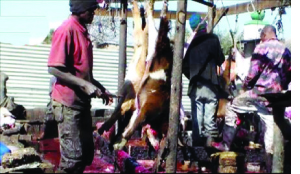 By MICHELO HIMAAMBO –
By MICHELO HIMAAMBO –
MEAT is good and scrumptious but the unhygienic method in which it is sold in open-air conditions in Lusaka should make one think otherwise before taking a second bite.
The reality is that many diseases ranging from cancer to heart conditions have come as a result of consuming meat especially when it is sold in unsightly conditions as it is done on many streets of Lusaka.
It is illegal to sell meat in the open, yes, but hundreds of traders would never prioritise health associated risks to the open air selling of, in some cases, uncertified meat to members of the public.
The traders’ only concern has been how to put money on their table for themselves and their families.
Lusaka’s City Market has become famous for such trade where the preservation or storage of meat is a big issue due to the fact the traders do not have refrigerators.
Lusaka City Council health officials have warned that the meat vendors present a serious health risk to unsuspecting clients who prefer buying meat product from the market rather than from certified butcheries because it is said to be cheaper.
The vendors rightly know and acknowledge the fact that there is a huge risk in the open trade of uncertified meat but would rather violate the laws in order to make a quick buck.
They do also believe that the meat is safe. They allay fears that there are long term effects that cause ill health in people consuming meat sold in unhygienic circumstances.
“We have to do this because we have families to take care of. If we do not do this our families will suffer so we will continue selling the meat,” said one meat trader who supports her family and sends her
children to school from her meat selling business.
“Why would it be a problem when we sell here but people in the rural areas can sell slaughtered animals from huts? In any case, where are the jobs?” a meat trader at Lusaka City Market said.
Notwithstanding the views of most vendors, the Public Health Act which regulates public health conduct in the country exclusively prohibits the sale of “unwholesome, diseased or contaminated articles of food” in places where meat should be not sold.
The Act also gives authority to health inspectors to assess places where animals are slaughtered, kept and sold and vendors found wanting are adequately penalised.
Some residents in townships like Kanyama and Misisi say they buy meat from the streets because it is more affordable compared to meat from licensed butcheries and shops.
Mary Mutale whom the author of this story found buying meat from an undesignated trader claimed that she was buying the meat from the streets because it was the only place she could afford to buy meat.
“That is what I can afford. Most butcheries charge K22 per kilogramme and that is a lot of money for someone with a large family like mine, plus my only income is raised through selling secondhand cloths” she explained.
LCC Public Relations Officer Habeenzu Mulunda says the council engaged the vendors association to help in getting rid of the people who traded in fresh meat, fish and chicken in open areas and it seemed that arrangement was not helpful because people were still selling fresh meat products illegally.
“The meat is illegally sold in these places, whether it is inspected or not because it is sold in an open area and it is illegal to sell fresh meat in an open market,” he said.
He said the meat vendors had become a nightmare for the council as they were difficult to control.
“We have a challenge in controlling the vendors in the capital, including meat vendors, and it is common knowledge that we do not want them in the city as what they do is unhealthy and unhygienic.
We however have municipal police who are fighting hard to put everything in order,” Mr Mulunda said.
He disclosed that the council seized and confiscated meat whenever it confronted the vendors in this town because the traders were notorious for breaking the law.
He said the council was trying its best to rid the streets of the illegal meat traders.
Mulunda says the traders in the streets would always think the council was fighting them when the local authority was after restoring order on the streets.
“When we started to chase people from the streets, they retaliated by starting riots and that has made our work difficult because the traders are many compared to the number of LCC officers,” Mr Mulunda said.
He said the council has tried to sensitise traders in Lusaka to change the type of products they sold.
He said the council had even made it clear about dangers which the community was being exposed to through selling and consumption of meat.
“The council has not failed to fight this problem, we are making sure the vendors associations sensitise the traders and I believe when they realize what threat they pose to the health of others they will completely stop,” he said.
Mulunda says if the traders continued selling meat in spite of the sensitisation, then the council would start prosecuting them.
Open air selling of fresh meat products will particularly be dangerous to members of the public in the rain season when disease outbreaks fueled by poor sanitation conditions are most likely.
It I therefore hoped that local authorities would take steps to ensure that only traders certified to deal in fresh meat are allowed to stock the mat and related products.






